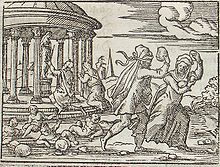What does pyrrha mean?
Definitions for pyrrha
pyrrha
This dictionary definitions page includes all the possible meanings, example usage and translations of the word pyrrha.
Did you actually mean pyuria or peoria?
Wikipedia
pyrrha
In Greek mythology, Pyrrha (; Ancient Greek: Πύρρα) was the daughter of Epimetheus and Pandora and wife of Deucalion of whom she had three sons, Hellen, Amphictyon, Orestheus; and three daughters Protogeneia, Pandora II and Thyia. According to some accounts, Hellen or Helmetheus was credited to be born from Pyrrha's union with Zeus.
Wikidata
Pyrrha
In Greek mythology, Pyrrha was the daughter of Epimetheus and Pandora and wife of Deucalion. When Zeus decided to end the Bronze Age with the great deluge, Deucalion and his wife, Pyrrha, were the only survivors. Even though he was imprisoned, Prometheus who could see the future and had foreseen the coming of this flood told his son, Deucalion, to build an ark and, thus, they survived. During the flood, they landed on Mount Parnassus, the only place spared by the flood. Once the deluge was over and the couple were on land again, Deucalion consulted an oracle of Themis about how to repopulate the earth. He was told to throw the bones of his mother behind his shoulder. Deucalion and Pyrrha understood the "mother" to be Gaia, the mother of all living things, and the "bones" to be rocks. They threw the rocks behind their shoulders, which soon began to lose their hardness and change form. Their mass grew greater, and the beginnings of human form emerged. The parts that were soft and moist became skin, the veins of the rock became people's veins, and the hardest parts of the rocks became bones. The stones thrown by Pyrrha became women; those thrown by Deucalion became men.
Numerology
Chaldean Numerology
The numerical value of pyrrha in Chaldean Numerology is: 1
Pythagorean Numerology
The numerical value of pyrrha in Pythagorean Numerology is: 5
Translations for pyrrha
From our Multilingual Translation Dictionary
Get even more translations for pyrrha »
Translation
Find a translation for the pyrrha definition in other languages:
Select another language:
- - Select -
- 简体中文 (Chinese - Simplified)
- 繁體中文 (Chinese - Traditional)
- Español (Spanish)
- Esperanto (Esperanto)
- 日本語 (Japanese)
- Português (Portuguese)
- Deutsch (German)
- العربية (Arabic)
- Français (French)
- Русский (Russian)
- ಕನ್ನಡ (Kannada)
- 한국어 (Korean)
- עברית (Hebrew)
- Gaeilge (Irish)
- Українська (Ukrainian)
- اردو (Urdu)
- Magyar (Hungarian)
- मानक हिन्दी (Hindi)
- Indonesia (Indonesian)
- Italiano (Italian)
- தமிழ் (Tamil)
- Türkçe (Turkish)
- తెలుగు (Telugu)
- ภาษาไทย (Thai)
- Tiếng Việt (Vietnamese)
- Čeština (Czech)
- Polski (Polish)
- Bahasa Indonesia (Indonesian)
- Românește (Romanian)
- Nederlands (Dutch)
- Ελληνικά (Greek)
- Latinum (Latin)
- Svenska (Swedish)
- Dansk (Danish)
- Suomi (Finnish)
- فارسی (Persian)
- ייִדיש (Yiddish)
- հայերեն (Armenian)
- Norsk (Norwegian)
- English (English)
Word of the Day
Would you like us to send you a FREE new word definition delivered to your inbox daily?
Citation
Use the citation below to add this definition to your bibliography:
Style:MLAChicagoAPA
"pyrrha." Definitions.net. STANDS4 LLC, 2024. Web. 23 Nov. 2024. <https://www.definitions.net/definition/pyrrha>.



Discuss these pyrrha definitions with the community:
Report Comment
We're doing our best to make sure our content is useful, accurate and safe.
If by any chance you spot an inappropriate comment while navigating through our website please use this form to let us know, and we'll take care of it shortly.
Attachment
You need to be logged in to favorite.
Log In